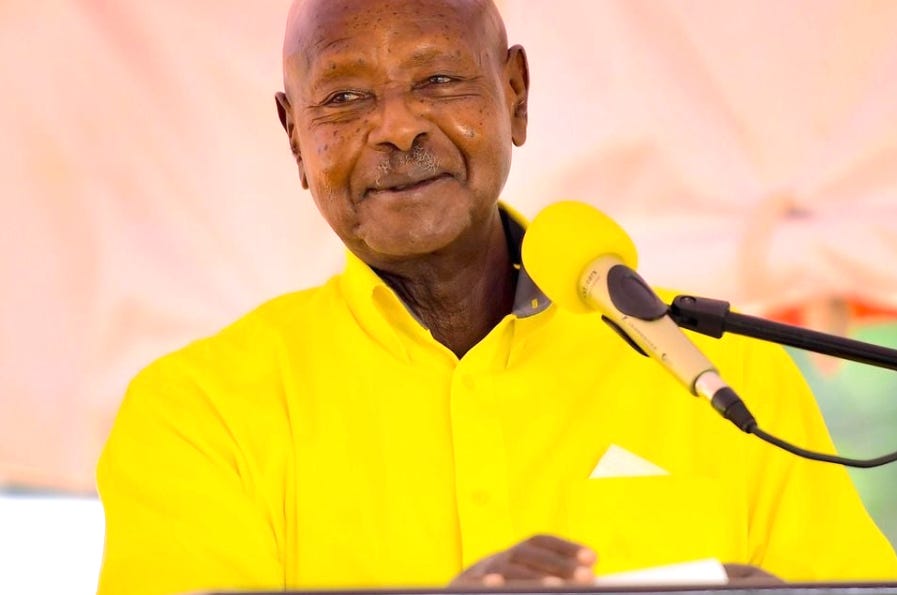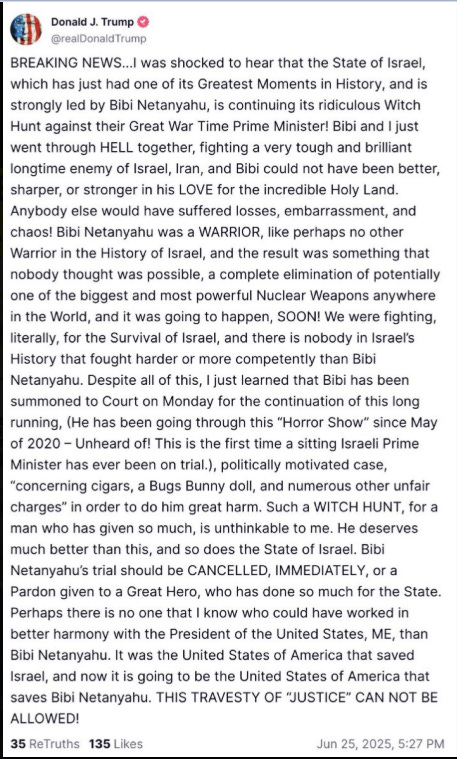Israel and Iran Maintain Fragile Ceasefire, EU and Canada Sign Defense Pact, U.S. Senate Advances the OBBBA, Musuveni to Contest in the 2026 Ugandan Presidential Election, and More
Grinfi Political Risk Intelligence Weekly Briefing
Welcome to this week’s edition of Grinfi Political Risk Edge, your trusted source for expert political risk analysis and strategic intelligence. In this issue, we examine key geopolitical events shaping the defense, energy, and DeFi markets, providing a deep, beyond-the-headlines assessment. Anticipate, Adapt, and Excel!
But first, let’s begin the week with a laugh 😄 to brighten the mood.
Help us serve you better and improve Grinfi Political Risk Edge by taking this brief, fully anonymized reader survey.
"A nation that does not protect its own people cannot claim to be sovereign."
Amilcar Cabral, Revolution in Guinea: Selected Texts. Translated by Richard Handyside, Monthly Review Press, 1969, p. 83
Disclaimer: The opinion expressed in this quote does not represent our views but is intended for reflection purposes only.
From Grinfi Political Risk Observatory (GPRO), here’s what we’re monitoring:
High Impact Situational Updates
MAJOR HEADLINES
— Controversial Media Reform Bill to Privatize Israeli Public Broadcaster Heads to Knesset
On June 29, Israel's Ministerial Committee for Legislation advanced a bill that would strip the Israel Public Broadcasting Corporation (IPBC) of its news and current affairs programming and open the broadcaster to full privatization. The IPBC operates Kan, Israel’s public radio and television services.
The bill, introduced by Likud MK Ariel Kallner, proposes transferring the corporation to qualified private bidders based on criteria that exclude personal political interests. It was approved despite objections from the Attorney General’s Office, which argued that the bill lacks adequate professional foundations and poses a threat to media independence.
The legislation now proceeds to the Knesset plenum for a preliminary reading. Communications Minister Shlomo Karhi has requested it skip review by the Knesset Economic Affairs Committee, chaired by MK David Bitan, who has previously blocked similar proposals.
The bill follows a series of efforts by Karhi to curtail the independence of the IPBC, including a previous proposal by MK Tally Gotliv to privatize the entire corporation within two years or shut it down if no buyer is found. Critics, including the Movement for Quality Government and the Association for Civil Rights in Israel, warn that the bill threatens press freedom and draws comparisons to Hungarian model. The Attorney General’s Office has raised concerns that the legislation could open the door to political interference in news content, thereby undermining Israel’s democratic foundations.
Supporters of the bill argue that the news division has demonstrated consistent bias against the government and that there is no justification for public funding of such content. However, given the serious corruption and pay-for-play allegations facing the Netanyahu government, many Israelis remain skeptical.
Critics fear the proposed privatization is a veiled attempt to suppress independent journalism and insulate the government from accountability.
— Trump Cautions Israel Against Prosecuting Netanyahu
On June 25, U.S. President Donald Trump publicly demanded that the Israeli judiciary halt the corruption trial against Prime Minister Benjamin Netanyahu, calling it a “political witch hunt.”
Netanyahu faces charges of bribery, fraud, and breach of trust, with prosecutors alleging that he traded regulatory favors for favorable media coverage and accepted luxury gifts from a billionaire. Netanyahu denies any wrongdoing, claiming the trial is politically motivated.
Trump has argued that the trial interferes with ongoing Gaza ceasefire talks and diplomacy with Iran, urging that it either be canceled or that Netanyahu be pardoned. The president made the statement in a lengthy post on Truth Social:
Netanyahu thanked President Trump for his support. In response, opposition leader Yair Lapid accused the United States of interfering in Israel’s judicial process, likening the move to treating Israel as a “banana republic.” He condemned the statement as an inappropriate act of political intrusion.
— U.S. Supreme Court Issues Ruling on Citizenship
On June 27, the U.S. Supreme Court issued a 6-3 ruling in Trump v. CASA, Inc. concerning the use of universal injunctions that block enforcement of President Trump’s Executive Order Number 14160, which aimed to limit birthright citizenship.
The Court did not address the constitutionality of the executive order itself, which remains under legal challenge. Instead, it focused on the procedural question of whether lower courts have the authority to issue injunctions that apply nationwide beyond the parties involved in the case.






